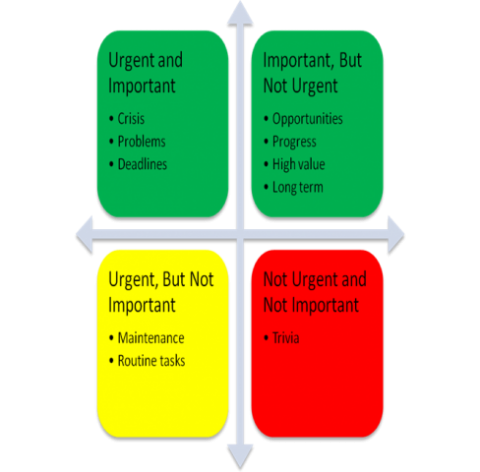A personal new year commitment to “better prioritise” has prompted me to reflect on the Time Management Matrix, originally proposed by former US President Eisenhower and more recently popularised in Covey’s seminal work “The 7 Habits of Highly Effective People”.
For those who are not familiar or need some reminding, the matrix explores the relationship between the urgency and importance of tasks/activities and as such helps to organise and prioritise multiple tasks. Broadly speaking, tasks will generally fit into one of the 4 matrix quadrants, as shown in the diagram below:

Perhaps not surprisingly, most of us tend to focus on the urgent tasks, and that’s fair enough, particularly if those tasks are also important (e.g. returning customer calls, servicing clients, dealing with immediate staff issues). But all too often we also find ourselves dragged into stuff that someone else might consider to be urgent, but in actual fact is not all that important to our goals (e.g. requests from staff to help with something minor, re-stocking office supplies).
These urgent but not so important items can become a real drain on time and energy, taking us away from the important though not urgent activities that can really make a difference (e.g. developing and reviewing a business plan, strategically positioning the business for future opportunities).
Reflecting again on Covey’s matrix got me thinking about how businesses and organisations tend to manage their people, and what it means for their individual and collective success. Sure, there’s a lot of HR activity that is both urgent and important (addressing immediate staff performance issues and recruiting staff to fill pending and recent vacancies, for example), and most businesses manage these items pretty well. What also occurred to me though is that there are a number of HR activities that fit into the important but not urgent quadrant and as a result often don’t get the time and attention they deserve.
As luck would have it, it’s often these not urgent but important activities that can add the most value to the business, that make the difference between your business and your competitors, that build future security and profitability. Consider for example the following HR-related functions, drawn from our Success Through People© Model:
- Setting Clear Expectations – most would agree it’s pretty important to set clear expectations for staff: the standard of work required, the quality of service you expect to be provided to your clients, the procedures you want staff to follow, and the way you expect them to conduct themselves in the workplace for example. Setting expectations occurs by means of a range of activities including the development and implementation of position descriptions, thorough induction of new staff, regular communication and formal and informal performance management measures – important but generally not urgent activities for most businesses.
- Managing Risk – most would also agree that it’s important to effectively manage business risk, whether it be compliance-related risk (e.g. in Australia, compliance with the Fair Work Act and the Work Health and Safety Act), or risk in terms of attracting and retaining quality staff and succession planning for key positions. Again, these things often only receive attention once they become urgent as a result of, for example, a key member of staff leaving or an external investigation into an industrial or health and safety issue.
- Equipping Others – building the capability of staff is critical to business success, yet in many smaller businesses in particular, it often takes a back seat. It’s one of those things “we’ll get to when things settle down”, though the reality of it is that the “settling down” often never comes. With increasing competition and increasing similarity in the range of products and services offered by many businesses, it has never been more true to say that the most successful businesses spend time, energy and resources making the most of their key differentiator – their staff.
A similar case could I suggest be made to encourage a focus on the remaining components of the Success Through People(c) Model. Think about your own business/organisation/team: while it may not be critically urgent, it’s likely to be important for your future success to also prioritise and focus on:
- Establishing and communicating clear vision, values and strategy
- Ensuring effective, consistent leadership
- Recruiting the right people, to the right roles, at the right time
- Building and reinforcing a culture of accountability
- Valuing the efforts of those contributing to success.
So what about you, and your business? Are you spending your time wisely, not just on the urgent activities, but also those important but perhaps non-urgent activities that have real potential to transform your business and ensure future success?
The Time Management Matrix is part of our Short N Sharp Training session “Where’d It Go? Time Management” – check out www.shortnsharptraining.com.au.

